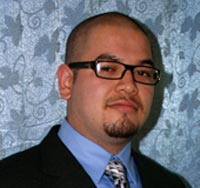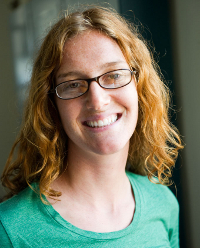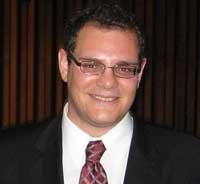« Previous
 My name is Sal, I was a teaching assistant for 3.091 in Fall 2009, and again in Fall 2010. This class is a lot of fun because it covers a vast range of applied chemistry, from the electronic structure of atoms, to phase diagrams of binary solutions. Throughout the course you will see the connections between science and engineering, while appreciating the history of how scientific discoveries were made. This class is truly awesome, and I hope you enjoy the lectures as well as the problem solving videos!
My name is Sal, I was a teaching assistant for 3.091 in Fall 2009, and again in Fall 2010. This class is a lot of fun because it covers a vast range of applied chemistry, from the electronic structure of atoms, to phase diagrams of binary solutions. Throughout the course you will see the connections between science and engineering, while appreciating the history of how scientific discoveries were made. This class is truly awesome, and I hope you enjoy the lectures as well as the problem solving videos!
Sal Barriga grew up in Modesto, California. After high school he enrolled in Modesto Junior College (MJC) to pursue a college degree, being the first in his family to do so. While at MJC he discovered a passion for math and science, earning an associate’s degree in physical science with honors. He then transferred to UC-Berkeley where he earned a bachelor’s degree in physics with high honors. Shortly after finishing college he started in the Ph.D. program in Materials Science and Engineering at MIT, working in Professor Sadoway’s research group. His research deals with numerical simulations for the scalability of liquid metal batteries, and measuring the diffusion coefficients of liquid metal alloys using electrochemical techniques. Sal has previously completed research projects in chemical adsorption of molybdenum selenide nanowire; SQUID-detected magnetic resonance imaging; microfabrication of bolometers; and characterizing single photon detectors known as avalanche photodiodes. He also holds numerous leadership awards, and for his teaching efforts in 2009 he was awarded the John Wulff Award for Excellence in Teaching from the Department of Materials Science and Engineering.
 Hi, I’m Jocelyn and welcome to 3.091 on MIT OpenCourseWare. In Fall 2009 I was a teaching assistant and had the opportunity to share the joys of Solid State Chemistry with 40 MIT students. Although I am now in the Materials Science department at MIT, my undergraduate degree was in Chemistry and I love how Professor Sadoway combines the basic elements of chemistry to describe materials systems in 3.091. During my video sessions I try to help you with the problem solving process. I always begin with the question statement: understanding what you are given and what you are asked to find. Hopefully the video sessions will augment your study of this course through OCW.
Hi, I’m Jocelyn and welcome to 3.091 on MIT OpenCourseWare. In Fall 2009 I was a teaching assistant and had the opportunity to share the joys of Solid State Chemistry with 40 MIT students. Although I am now in the Materials Science department at MIT, my undergraduate degree was in Chemistry and I love how Professor Sadoway combines the basic elements of chemistry to describe materials systems in 3.091. During my video sessions I try to help you with the problem solving process. I always begin with the question statement: understanding what you are given and what you are asked to find. Hopefully the video sessions will augment your study of this course through OCW.
Jocelyn Newhouse is a graduate student in the Department of Materials Science and Engineering at the Massachusetts Institute of Technology. She obtained her B.A. in Chemistry from Grinnell College. After a year of work and travel she joined the Sadoway research group where she is pursuing her Ph.D. Her research explores the properties of liquid metal alloys as they apply to large-scale rechargeable batteries.
 Hi there! My name is Brian and I am a graduate researcher in the Sadoway Research Group. My experiences with 3.091 include being a teaching assistant for two sections from 2009-2010 and working as a grader/tutor for the class. One of the unique characteristics of 3.091 is how rapidly we move through material and how easy it is to forget the links between the topics. Professor Sadoway often references a “spiral of learning” which is something worth stressing here. Although it may seem as though we’re rushing through disparate or disjointed topics, the reality is that everything we learn in 3.091 can not only be linked to other important topics from earlier in the class but often further elaborates or expands upon more simplified concepts which we took for granted in the beginning of the course.
Hi there! My name is Brian and I am a graduate researcher in the Sadoway Research Group. My experiences with 3.091 include being a teaching assistant for two sections from 2009-2010 and working as a grader/tutor for the class. One of the unique characteristics of 3.091 is how rapidly we move through material and how easy it is to forget the links between the topics. Professor Sadoway often references a “spiral of learning” which is something worth stressing here. Although it may seem as though we’re rushing through disparate or disjointed topics, the reality is that everything we learn in 3.091 can not only be linked to other important topics from earlier in the class but often further elaborates or expands upon more simplified concepts which we took for granted in the beginning of the course.
Brian Spatocco grew up in a small town in southern New Jersey and is the first in his family to pursue a Ph.D. in science or engineering. His current interests include large-scale energy storage, U.S. power grid security, technology policy, and American innovative competitiveness. His prior degrees include a B.S. in Materials Science from Rutgers University and an M.Phil. in Micro- and Nano-Technology Enterprise from Cambridge University, where he studied as a Gates Scholar. He currently pursues his Ph.D. thanks in large part to fellowships from the National Science Foundation and Tau Beta Pi, and research grants from the Department of Energy. In his free time, when not doing research or teaching, he enjoys following international politics, traveling and learning to cook foreign foods, and networking with exciting people.
« Previous










